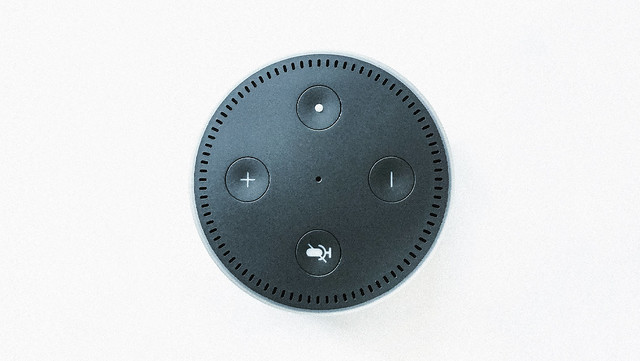Capitol Hill, Seattle. That’s the location of the most futuristic supermarket on the planet, the Amazon Go Grocery store. Today it opened its doors to the general public for the first time, and this was my experience.
Continue reading “I experienced the future of supermarkets: Amazon Go Grocery”Tag: artificial intelligence
Time travel through 2010s technology: Part 2
In the first part of the series “Time travel through 2010s technology” we looked at how operating systems, phones, tablets, smartwatches and smartglasses changed through the last decade. The 2010s changed how we interact with technology, but more importantly, how we think about the impact it has in our lives.
So what happened in the last ten years? How did we get here?
Continue reading “Time travel through 2010s technology: Part 2”My 95-year-old grandma’s first experience with Alexa
Every time I go back home to Spain, I spend a considerable amount of time tuning up my family’s devices. My mom’s Surface is stuck on some big update, my dad’s phone doesn’t have the Weather app that he wants, etc. Technology nowadays is more complicated than it should be, and older generations are not usually well equipped to troubleshoot issues. Nonetheless, most tech companies are working towards a future without complicated user interfaces, a future controlled by natural language commands that even a 5 year old can master. Artificial intelligence is at the center of this future.

Unboxing Google’s 7 new principles on Artificial Intelligence
How many times have you heard that Artificial Intelligence (AI) is humanity’s biggest threat? Some people think that Google brought us a step closer to a dark future when Duplex was announced last month, a new capability of Google’s digital Assistant that enables it to make phone calls on your behalf to book appointments with small businesses. You can see it in action here:
The root of the controversy lied on the fact that the Assistant successfully pretended to be a real human, never disclosing its true identity to the other side of the call. Many tech experts wondered if this is an ethical practice or if it’s necessary to hide the digital nature of the voice.

Continue reading “Unboxing Google’s 7 new principles on Artificial Intelligence”
Amazon Go: A.I.’s grim face?
I have been waiting since college on RFID’s failed promise to deliver a walk-away checkout experience, and Amazon finally made it possible. After reading my co-blog writer’s experience in the Amazon Go store I had to check it out for myself and was excited for it. All my friend’s pictures were of long lines, but thankfully I am a morning person and there was no line when I got there. My goal was to pretend I had no idea what it was or how it worked. My experience overall was good, with the exception of the on-boarding process. I was greeted with a condescending “oh, you don’t have the app?” and was asked to stay aside. My T-Mobile reception was very poor so it took me a bit to get started. Once I downloaded the app and signed into my Amazon account everything was smooth. Mission accomplished! In this post, I’m not going to talk about the actual store (Ivan did a great job already) but about the implications of the first tangible and successful AI automated store.

Automation has always been part of our history. Automation has helped us evolve into the society we have now. Such as, automating how we grow and crop food so we can have a good food supply, the industrial revolution to make things faster and cheaper, the assembly line to make them even faster and cheaper, and finally computers to automate processes and tasks. Now, AI is here and it will automate all of our productivity.
I experienced the future of retail: Amazon Go
“The craziest thing I’ve seen is someone who came in dressed in a Pikachu costume,” said an Amazon employee while she handed me a promotional bag with the Amazon Go logo on one side and the text ‘good food fast’ on the other.
I arrived at the new store in downtown Seattle around 7:20 pm and was surprised to see the line of people still reached the end of the block. It had been a cold day in Seattle but that didn’t discourage the hundreds of people who came to see the ‘magical’ store on day 0. I didn’t use the term ‘magical’ lightly here: the experience was truly unique and it felt too good to be true. Amazon Go is probably the store with more sensors on the planet right now, and it is intimidating:

Each of those boxes on the ceiling are cameras connected to deep learning algorithms that analyze every move you make: which aisle you walk through, what items you grab to read and then return to the shelf, what items you put in your pockets or bag… everything to ensure you only get charged for what you take home. But also, everything to ensure your shopping pattern is studied and well understood. Maybe not today, but it’s the inevitable next step and the ultimate dream for any retail store: to know what their customers like and the type of advertisements that will work best on them.
Continue reading “I experienced the future of retail: Amazon Go”
Are you rude to your virtual assistant?
2017 has been the year of the smart speaker. Amazon’s Echo Dot and Google’s Home Mini are currently selling for around $30, which makes them a popular Christmas gift. Using an Artificial Intelligence (AI) has never been cheaper and it’s finally reaching critical mass.

Companies are investing on AI more than ever: natural language recognition still has to improve a lot, but the current algorithms are already impressive. My favorite example: it’s now possible to ask “how long would it take me to get to Starbucks on 15th Ave?” and get an accurate response with the right assumptions. What a time to be alive!
All of this progress comes with side effects: having to learn how to talk to a machine. Often, people start talking without the wake-up keyword, and sometimes they forget to check if the device is actually listening, getting confused when there is no response to their inquiry. Talking to a machine is not easy and usually, very unsatisfactory.
Perhaps that dissatisfaction is what makes us be less aware about our manners when addressing an AI. What would you think if someone interrupted you mid-sentence with a sudden “STOP”? What if someone kept giving you orders relentlessly, never pausing to thank you? That’s how most of us talk to AI’s like Alexa or Siri, never saying “please” or “thank you”.
Why we will never fall in love with our smartphone’s virtual assistant
After watching Her last night (the Golden Globe winner for the Best Screenplay category) I was captivated by its amazing performances and its delightfully depicted technology. What motivated me the most to watch the movie was this article from Wired: why Her will dominate UI design even more than Minority Report.
In the movie, technology is almost completely transparent for the user: most of the interactions between Theodore, the main character, and his “smartphone” happen through the earpiece and the virtual assistant, and he only touches the little screen when he wants to watch a picture. This is what his gadgets look like:

Visual user interfaces are almost nowhere to be seen, and that’s the message: human interactions are the future of personal computing.
Continue reading “Why we will never fall in love with our smartphone’s virtual assistant”


